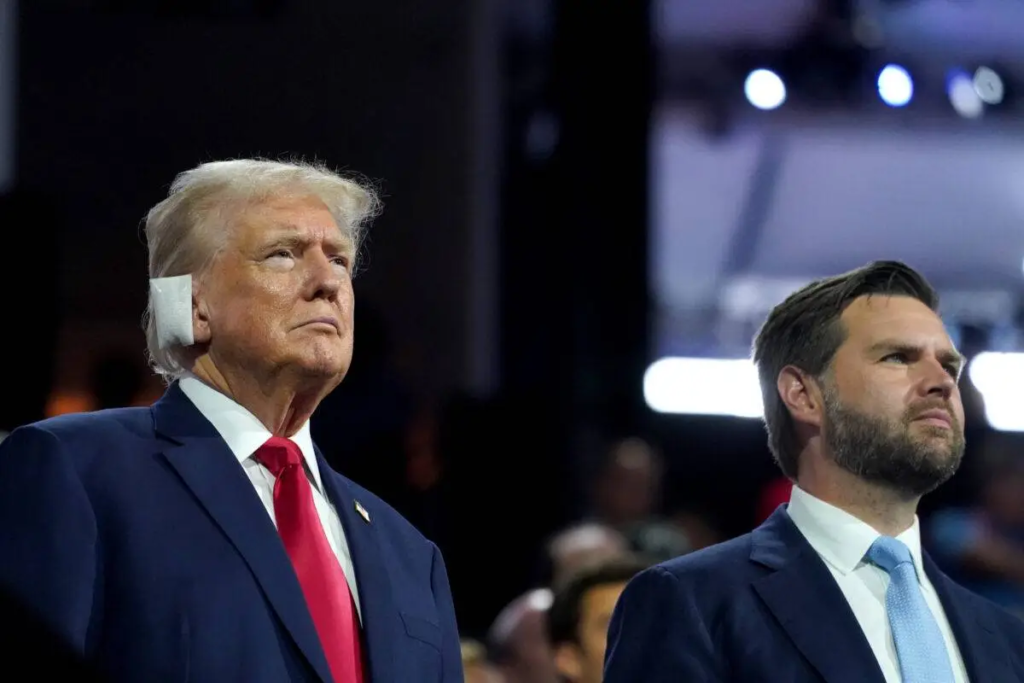The political landscape of the United States is known for its dynamic shifts and surprising alliances. One such potential alliance that has garnered attention is the possible vice-presidential candidacy of J.D. Vance alongside former President Donald Trump. J.D. Vance, an influential figure in the Republican Party and author of the bestseller “Hillbilly Elegy,” is recognized not only for his domestic policy stances but also for his strong pro-Israel stance. This article explores Vance’s potential role as Vice President, his pro-Israel advocacy, and its implications for U.S. foreign policy.
J.D. Vance: A Rising Star in Republican Politics
J.D. Vance burst onto the national stage with his memoir “Hillbilly Elegy,” which chronicled the struggles of working-class Americans in the Rust Belt. His book resonated with many, propelling him into the political arena. Vance’s background, characterized by a blend of academic achievement and personal experience with poverty, provides him with a unique perspective on policy issues. His political views align closely with populist ideals, focusing on economic nationalism, social conservatism, and a commitment to addressing the concerns of the American middle class.
Pro-Israel Stance
Vance’s support for Israel is well-documented, aligning him with a significant faction of the Republican Party that sees a strong U.S.-Israel relationship as paramount. Several key aspects highlight his pro-Israel advocacy:
- Support for Israel’s Security: Vance has consistently emphasized the importance of ensuring Israel’s security amidst regional instability. He supports military aid to Israel, viewing it as a crucial element in maintaining balance and peace in the Middle East.
- Opposition to Anti-Israel Movements: Vance is a vocal critic of movements such as the Boycott, Divestment, Sanctions (BDS) campaign against Israel. He argues that such movements undermine legitimate discourse and unfairly target Israel.
- Backing Israeli Sovereignty: Vance advocates for recognizing Israel’s sovereignty over contentious areas, aligning with Trump’s policies, such as moving the U.S. Embassy to Jerusalem and recognizing Israeli sovereignty over the Golan Heights.
Potential Vice Presidency: Implications for U.S.-Israel Relations
Should J.D. Vance become the Vice President under Donald Trump, his pro-Israel stance would likely shape the administration’s foreign policy significantly. Here’s how his vice-presidency could influence U.S.-Israel relations:
- Continued Military Support: Vance would likely advocate for the continuation and possibly an increase in military aid to Israel. This would ensure that Israel maintains a qualitative military edge over potential adversaries, bolstering its defense capabilities.
- Diplomatic Backing: Vance’s vice-presidency would ensure robust diplomatic support for Israel at international forums such as the United Nations. This could involve vetoing resolutions perceived as unfairly critical of Israel and pushing for policies that align with Israeli interests.
- Economic and Technological Collaboration: Vance could spearhead initiatives to enhance economic and technological collaboration between the U.S. and Israel. This would encompass joint ventures in sectors such as cybersecurity, agriculture, and medicine, benefiting both nations.
- Countering Iran: A Vance vice-presidency would likely continue Trump’s hardline stance on Iran, focusing on preventing it from acquiring nuclear capabilities. This policy is crucial for Israel’s security, given its concerns about Iran’s regional ambitions and support for proxy groups hostile to Israel.
- Peace Process: While the Trump administration took significant steps in the Middle East peace process, including the Abraham Accords, a Vance vice-presidency might further these efforts. However, his approach would likely continue to prioritize Israeli security and interests, possibly making Palestinian negotiations more complex.
Domestic Impact and the Republican Base
Vance’s pro-Israel stance is also significant for domestic politics, as it resonates with a key segment of the Republican base, including evangelical Christians and conservative Jewish voters. His advocacy strengthens his appeal among these groups, who view unwavering support for Israel as a crucial policy issue. This alignment can consolidate support for the Trump-Vance ticket, potentially influencing voter turnout and engagement in critical swing states.
J.D. Vance’s potential vice-presidential candidacy alongside Donald Trump brings a unique blend of domestic populism and strong pro-Israel advocacy to the forefront of American politics. His steadfast support for Israel could shape U.S. foreign policy in ways that reinforce the strategic alliance between the two nations. As the political landscape continues to evolve, Vance’s influence could play a pivotal role in both the Republican Party’s future direction and the broader geopolitical dynamics of the Middle East.


